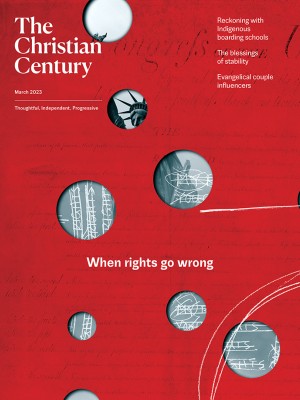March 12, Lent 3A (Exodus 17:1-7; Psalm 95; John 4:5-42)
Water dominated the imaginations of our ancestors in faith, whose stories often called for either a canteen or galoshes.
Maria. Katrina. Sandy. Mitch. China. Bangladesh. Ethiopia. The Dust Bowl.
Water is one of those things: you can’t live with it; you can’t live without it. Too much will cover everything with terrifying, monstrous waves and leave a soggy, smelly, mucky mess behind, often with lingering issues like cholera and homelessness. Too little water and the plants shrivel up; the ground cracks and mingles with the air; the people die in short order unless they can find a place to relocate—a place with water.
Water dominated the imaginations of our ancestors in faith, and the telling of their stories often called for either a canteen or galoshes, a miraculous spring or a lifeboat. A watery chaos covers the unformed land in Genesis, yet God moves over it effortlessly, in the form of a breath. A genocidal flood devastates all creation, saving only a righteous few, killing all the wicked ones. (Is that a better reason for a genocidal flood than in Mesopotamia’s flood tale, in which the deities drown all the humans because they are so darned noisy?)
Read our latest issue or browse back issues.
As the story goes on, wells connote meeting wives—and even, for the cast-out Hagar and her son, meeting God. A malicious ruler orders the deaths of a slew of sons in the Nile. His own army eventually meets its demise in a miraculous rush of water that holds off only while a band of Hebrews escaping enslavement are in the riverbed.
After moving from the obedient river to the desolate desert, in today’s first reading they camp at a place called Support (Rephidim). Once there, God helps Moses find water for the complaining community, so that place is named Test (Massah) and Strife (Meribah); the latter actually indicates a legal challenge.
The Israelites have a good point when they demand of Moses, “Is the Lord among us or not?” If we are not asking that question, someone nearby is, whether because they are drowning in water or thirsting for it, literally or metaphorically. How hard it is to know whether to revel in God’s abundance or to bring charges against divine negligence.
The 95th psalm poetically recalls the Meribah and Massah event with verses that extol the Lord for commanding water when it mattered, at creation. But those meaningful place-names remain a warning: be thankful, not complaining; trust and do not test.
To be clear: the abundant water imagery in the Gospel of John is no innovation. The Gospel writer is drawing on a long tradition. Yes, this is a God with water on her hands, a God wearing waders to wrangle his people, a God moving monsoons to heal and help their leaders and little ones alike. It would seem that water conducts divinity.
Jesus’ voice through the Gospel of John insists that the waters of baptism only continue our journey, one that started with the waters of birth. John 4:1–42 adds to what was already a holy, colorful, compelling collage of watery scenes, one that narrated the journey of divine and human connection.
If sacraments work by bringing the past into the present, then all these waters—from creation to the Flood to the exodus to Meribah and Massah to Jacob’s well where a Samaritan woman discusses theology with Jesus—join us at our baptism and beyond to connect us with the holy.
Ta-Nehisi Coates’s compelling novel The Water Dancer gets our feet wet again, and it rightfully belongs to the dialogue with these watery scriptures. We cannot resist joining the journeys of his characters Hiram, Thena, and Sophia through waters that both threaten and save, miraculously and persistently connecting generations despite their brutal, repeated separations enforced by the human trafficking that defined antebellum America. This narrative should compel us to edit the adage “blood is thicker than water”: it turns out that blood and water work hand in hand. Instead of a salvific underground railroad, Coates imagines an otherworldly waterway with Harriet Tubman as the messiah. Our theological imaginations and enfleshed communities crave the nourishment this imagery provides.
Our own stories join in as well, of suffering at the hands of those who only saw new life for themselves across vast oceans; of travels across great seas with Edenic dreams awaiting; of congregations gathered around baptistries; of denominations splitting over sprinkling, pouring, or dunking; of communities fighting off encroaching waterlines by embracing care for the planet; of tribes strategizing to protect sacred lifelines from pipelines.
We encounter Meribah, Massah, Jacob’s well, and Samaritan women every day, prompting us to demand anew, “Is the Lord among us or not?” We seek nothing less than living water, which belongs to everyone, complainers and otherwise.





